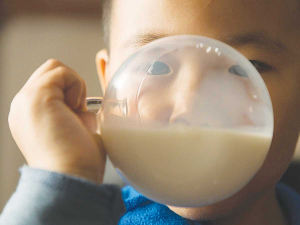Formula goes sour
OPINION: Media reports say global recalls tied to cereulide toxin contamination in milk-based nutrition brands could inflict combined financial losses exceeding $1 billion.
 New Zealand infant formula exports to China topped nearly $1 billion in 2021, according to the Ministry for Primary Industries.
New Zealand infant formula exports to China topped nearly $1 billion in 2021, according to the Ministry for Primary Industries.
The once-lucrative Chinese infant formula market is shrinking.
Three factors - China’s negative population growth, economic downturn, and a more stringent regulatory environment – are driving down sales of infant formula.
New Zealand infant formula exports to China topped nearly $1 billion in 2021, according to the Ministry for Primary Industries. However, sales dropped last year to around $806m. Sales could be even lower in 2023 as NZ companies await China’s State Administration of Market Regulation (SAMR) registration which allows them to export branded infant formula to China.
Consultant Jane Li of Li, Page & Co. believes the hey days of infant formula sales in China are over.
“It’s very doomed, the infant formula pie is shrinking,” she told Rural News.
“There are fewer babies being born in China.”
At the same time, the Chinese economy hasn’t recovered to pre-Covid days, she adds.
“Remember China had the harshest lockdowns in the world over the past three years.”
Li believes the new regulations around infant formula is the Chinese Government’s continuing efforts to appease consumer after the melamine scandal in 2008 and gain political trust.
She says the new regulations are aimed at reducing the number of baby formula brands. She believes the new regulations will only make it viable for major domestic players and multi nationals to play in China.
But Li says Fonterra has nothing to worry about, as the co-operative’s food service and ingredients businesses in China is strong.
“Chinese consumers’ disposable income has dropped significantly so they are spending less on non-essentials such as the latest clothing and cosmetics and more on comfort food. Fonterra serves this industry well,” she says.
Fonterra sells Anmum branded Infant Formula and Materna nutrition in China, as well as ingredients to other brand owners who sell in the China market.
The co-operative says it is progressing through the China re-registration process, along with others in the industry.
“The China Infant Formula market is undergoing structural change, with declining birth rates and heightened regulation driving consolidation and rationalisation across the industry,” it told Rural News.
“Infant Formula makes up a relatively small part of Fonterra’s broader China business. Our China Food Service and Ingredient businesses are performing well.”
MPI’s Deputy Director-General, New Zealand Food Safety, Vincent Arbuckle says MPI is working closely with New Zealand companies on the China infant formula product registration process and is committed to helping ensure it continues to run as efficiently as possible.
So far this year, three New Zealand infant formula companies have had their products registered by SAMR.
As part of the China infant formula product registration process, China requires onsite audit of manufacturing facilities, says Arbuckle.
“To date, SAMR has asked MPI to conduct audits of nine New Zealand infant formula manufacturers,” he told Rural News.
“Five have been completed, with a further one currently underway. The remaining three were notified to MPI last week. The five manufacturers account for almost 87% of infant formula by volume exported from New Zealand to China in the first four months of 2023.”
China announced strict controls on infant formula composition as part of its new GB (food safety) legislation standards two years ago. The new rules kicked in from February this year.
Re-registration of the product is required. The on-site verification audit is the last step in the re-registration process before requesting final approval by SAMR.
Arbuckle says MPI has been working closely with New Zealand infant formula manufacturers over the last two years to ensure they are aware of China’s product registration requirements and standards, and the timelines involved.
“MPI understands there may be up to 15 New Zealand infant formula companies that have or intend to apply for product registration.”
Former Fonterra executive Alex Turnbull has been appointed CEO to lead all five Yili Oceania Business Division companies in New Zealand.
Fonterra executive René Dedoncker is leaving the co-operative later this year to lead Australian agribusiness Elders.
Alliance Group and the Southland Stags rugby team have joined forces in a partnership that will see the the meat co-operative's farmgate brand feature on players' team kits and replica jerseys.
Fonterra's plan to expand its organic programme to the South Island is being well received by farmers, the co-op says.
Voting has started for the renewal of DairyNZ's milksolids levy.
The most successful catchment groups in NZ are those that have 'a source to sea' approach.

OPINION: Here w go: the election date is set for November 7 and the politicians are out of the gate…
OPINION: ECan data was released a few days ago showing Canterbury farmers have made “giant strides on environmental performance”.